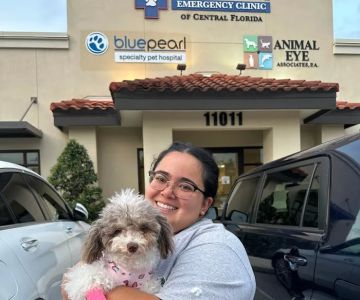What is a Veterinarian? The Basics of Animal Care Professionals
When we think of veterinarians, many of us imagine professionals who care for sick pets, administer vaccinations, or provide check-ups for our furry companions. However, the role of a veterinarian goes much deeper than just treating animals. In fact, veterinarians are highly trained medical professionals who specialize in the care, diagnosis, and treatment of a wide range of animals, including pets, livestock, and even wildlife. Understanding the vital role veterinarians play in our society is crucial for anyone who cares about animal health and well-being.
1. The Role of a Veterinarian: More Than Just Pet Care
A veterinarian, often referred to as a "vet," is a medical professional responsible for diagnosing and treating animals, much like a physician for humans. They are trained in areas such as animal biology, pharmacology, surgery, and preventive care. Veterinarians work in various settings, including private animal practices, research laboratories, farms, and wildlife conservation programs. Their primary goal is to ensure the health and well-being of animals by preventing, diagnosing, and treating diseases, injuries, and conditions.
Additionally, veterinarians are vital in public health, as they help manage zoonotic diseases—diseases that can spread from animals to humans. Their role extends to educating pet owners, farmers, and even the public about the best practices for maintaining healthy animal populations, which ultimately benefits human health as well.

11011 Lake Underhill Rd, Orlando, FL 32825, USA
See Details2. Educational Path and Training to Become a Veterinarian
Becoming a veterinarian requires years of education and training. In the United States, a prospective veterinarian must complete a bachelor's degree followed by a four-year veterinary medicine program. Veterinary schools are competitive, requiring students to have a strong academic background in science courses such as biology, chemistry, and physics. After graduation, veterinarians must pass licensing exams in their respective states or countries before they can practice.
Furthermore, many veterinarians choose to specialize in specific areas of animal care, such as surgery, dermatology, or oncology. This specialization typically involves additional years of training and certification. Specialization allows veterinarians to provide more focused care for specific types of animals or conditions, contributing to better overall outcomes for animals in need.
3. Common Duties and Responsibilities of Veterinarians
The duties of a veterinarian can vary depending on their specific practice or area of specialization. In general, veterinarians are responsible for:
- Diagnosing animal health issues: Vets assess animals, perform diagnostic tests, and interpret results to identify medical conditions.
- Treating injuries and illnesses: Veterinarians administer treatments, prescribe medications, and perform surgeries to treat a wide range of conditions.
- Preventive care: Routine vaccinations, health check-ups, and parasite control are essential parts of a veterinarian's role in preventing diseases.
- Emergency care: Veterinarians often deal with critical situations such as accidents, poisoning, or sudden illnesses requiring immediate intervention.
- Educating pet owners: A veterinarian's job also includes advising pet owners on proper animal care, nutrition, and behavior.
Veterinarians may work with a wide variety of species, including domesticated pets, farm animals, and even exotic animals in zoos or wildlife reserves. Their skills and expertise are crucial in ensuring that animals lead healthy, comfortable lives.
4. The Impact of Veterinarians on Animal Health and Welfare
Veterinarians play a significant role in improving the health and welfare of animals. Through their expertise, they help reduce the suffering of animals by providing timely and accurate treatments. In rural areas, veterinarians are often instrumental in keeping livestock healthy, which directly impacts the local economy and food supply.
Beyond treating individual animals, veterinarians also contribute to larger-scale efforts such as disease prevention and animal welfare advocacy. For example, veterinarians working in wildlife conservation efforts help monitor and protect endangered species, conduct research on animal habitats, and promote sustainable practices that benefit both animals and their ecosystems.
5. Specialized Fields within Veterinary Medicine
Veterinarians can specialize in various fields to provide more specific and advanced care. Some of the most common veterinary specialties include:
- Surgery: Surgeons focus on performing complex surgeries such as joint replacements, tumor removals, and trauma care.
- Dermatology: Veterinarians specializing in dermatology address skin conditions, allergies, and other skin-related issues in animals.
- Emergency and Critical Care: This specialization deals with urgent and life-threatening conditions that require immediate attention, such as trauma or severe infections.
- Oncology: Oncologists treat cancer in animals, working with pet owners to provide treatment plans that can extend the life and comfort of pets battling cancer.
- Behavioral Medicine: Vets specializing in animal behavior help address behavioral issues in pets, such as aggression, anxiety, and compulsive behaviors.
6. How to Find a Trusted Veterinarian for Your Pets
Choosing the right veterinarian for your pet is crucial to ensuring their long-term health and well-being. When selecting a vet, consider factors such as:
- Experience and qualifications: Ensure the veterinarian is licensed and has experience with the specific breed or type of animal you own.
- Location and availability: Find a veterinarian who is conveniently located and offers emergency care if needed.
- Reputation: Read reviews, ask for recommendations from other pet owners, and visit the clinic to ensure it meets your expectations for care.
- Communication and comfort: It's important that you and your pet feel comfortable with the veterinarian, as open communication is key to successful treatment.
When searching for a veterinarian, it's helpful to start by asking friends, family, or pet owners in your community for referrals. Additionally, many veterinary practices offer consultations, so you can assess the clinic's services before making a final decision.
Conclusion: The Essential Role of Veterinarians in Our Lives
Veterinarians are more than just animal doctors—they are essential to maintaining the health, safety, and welfare of animals around the world. Whether you're a pet owner, farmer, or animal enthusiast, understanding the important work that veterinarians do is vital. From treating pets to conserving wildlife, veterinarians are at the forefront of ensuring animals lead healthy and fulfilling lives.










